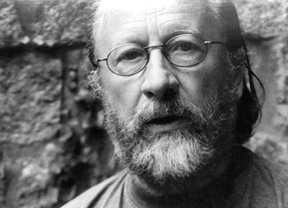Georg Katzer facts for kids
Quick facts for kids
Georg Katzer
|
|
|---|---|
 |
|
| Born | 10 January 1935 Habelschwerdt, Lower Silesia
|
| Died | 7 May 2019 (aged 84) Zeuthen, Germany
|
| Occupation | Composer |
| Awards |
|
Georg Katzer was a German composer and teacher. He was born on January 10, 1935, and passed away on May 7, 2019. He was a very important person in German music.
Katzer was the last "master student" of a famous composer named Hanns Eisler. This means he learned directly from Eisler at a very high level. Georg Katzer wrote many different kinds of music. He was also one of the first people to create electronic music in East Germany. He even started the first studio for electronic music there.
He held important jobs in music groups, both in East Germany and later in the united Germany. He won many awards for his amazing work.
Contents
A Life in Music
Georg Katzer was born in a place called Habelschwerdt on January 10, 1935. This area is now part of Poland.
Early Studies
From 1954 to 1960, he studied music in East Berlin. He learned to play the piano and studied music theory and composition. Some of his teachers were Rudolf Wagner-Régeny and Ruth Zechlin. He also studied for a year in Prague.
Later, from 1961 to 1963, he continued his studies. He was a special student of Hanns Eisler at the German Academy of the Arts in Berlin. He was Eisler's very last master student. After finishing his studies in 1963, he became a freelance composer. This means he worked for himself, creating music.
Working with Electronic Music
In the late 1970s, Katzer explored electronic music. He worked in special studios in Bratislava and Paris. These studios allowed him to create music using electronic sounds.
In 1978, he became a member of the Academy of the Arts in East Berlin. This is a special group for important artists. In 1980, he became a professor there. He taught advanced composition classes until 1991.
In 1986, he started the Studio for Experimental Music. This studio was part of the Academy of the Arts. He was its artistic director, guiding its creative work.
Leadership in Music
Katzer was a member of the Academy of Arts in East Berlin for many years. After Germany became one country, he was a member of the Berlin section of music until he passed away. He was also the vice president of the music section from 1994 to 2003.
He held other important roles too. He was president of the German Section of the C.I.M.E. This is an international group for electroacoustical music. He was also a leading member of the Deutscher Musikrat, which is the German Music Council.
Georg Katzer lived near Berlin in a town called Zeuthen. He passed away there on May 7, 2019, at the age of 84.
Katzer's Musical Creations
Georg Katzer's music changed over time. His early works were influenced by composers like Béla Bartók and Igor Stravinsky. He also learned a lot from his teacher, Hanns Eisler.
New Musical Styles
In the late 1960s, he started to try new things. He was influenced by composers like Witold Lutosławski. He moved away from traditional ways of writing music. He began to use different techniques, including:
- Serial music: A way of organizing notes in a specific order.
- Aleatory music: Music where some parts are left to chance or the performer's choice.
- Collage techniques: Mixing different musical ideas or sounds together.
- Electronic sounds: Using sounds created by machines.
Types of Compositions
Katzer wrote many different kinds of music. His works included:
- Music for small groups of instruments (chamber ensembles).
- Music for large orchestras.
- Concertos for solo instruments with an orchestra.
- Operas (musical plays with singing).
- Ballets (stories told through dance and music).
- Puppet plays.
- Oratorios (large musical works for voices and orchestra, usually telling a story).
He also created special pieces using electronic sounds. He wrote music for radio dramas (plays heard on the radio). He worked on multimedia projects, which combine different art forms. He even created projects that involved improvised music, where musicians make up the music as they play.
Here are some examples of his many compositions:
- String Quartet No. 1 (1965)
- Baukasten für Orchester (Building Blocks for Orchestra) (1972)
- Die Igeltreppe (The Hedgehog Staircase) for a narrator and 13 instruments (1973)
- Das Land Bum-Bum (The Land Bum-Bum), an opera (1973)
- D-Dur Musikmaschine (Music Machine in D Major), for orchestra (1973)
- Schwarze Vögel (Black Birds), a ballet (1975)
- Concerto for Harpsichord and Wind Quintet (1978)
- Ein neuer Sommernachtstraum (A New Midsummer Night's Dream), a ballet (1979)
- Gastmahl oder über die Liebe (Feast or About Love), an opera (1987)
- Antigone oder die Stadt (Antigone or the City), an opera (1989)
- Mein 1989 (My 1989), a radio composition (1990)
- Medea in Korinth, oratorical scenes (2002)
Awards and Recognition
Georg Katzer received many awards for his contributions to music:
- 1976: Art Prize of the German Democratic Republic
- 1981: National Prize of the German Democratic Republic for his complete works
- 1987: Kunstpreis des FDGB (Art Prize from the Free German Trade Union Federation)
- 1992: Kulturpreis Schlesien des Landes Niedersachsen (Silesian Culture Prize of Lower Saxony)
- 1992: Honorary guest of the Villa Massimo (a famous German academy in Rome)
- 1998: Johann-Wenzel-Stamitz-Preis
- 2003: Officer's Cross of the Order of Merit of the Federal Republic of Germany (a high honor from Germany)
- 2011: Preis der deutschen Schallplattenkritik (German Record Critics' Award)
- 2012: German Music Authors' Prize in the category of Experimental Music Composition
 | Shirley Ann Jackson |
 | Garett Morgan |
 | J. Ernest Wilkins Jr. |
 | Elijah McCoy |

